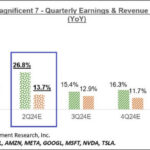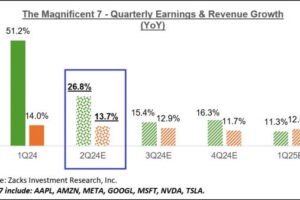<p class="canvas-atom canvas-text Mb(1.0em) Mb(0)–sm Mt(0.8em)–sm" type="text" content="The competition is coming for Netflix (NASDAQ: NFLX).” data-reactid=”11″>The competition is coming for Netflix (NASDAQ: NFLX).
<p class="canvas-atom canvas-text Mb(1.0em) Mb(0)–sm Mt(0.8em)–sm" type="text" content="With the upcoming launches of Apple (NASDAQ: AAPL) TV+, Disney‘s (NYSE: DIS) Disney+, and AT&T‘s streaming service, the field is going to get crowded — those entries join Hulu, Amazon, and others vying for cord-cutter dollars.” data-reactid=”12″>With the upcoming launches of Apple (NASDAQ: AAPL) TV+, Disney‘s (NYSE: DIS) Disney+, and AT&T‘s streaming service, the field is going to get crowded — those entries join Hulu, Amazon, and others vying for cord-cutter dollars.
<p class="canvas-atom canvas-text Mb(1.0em) Mb(0)–sm Mt(0.8em)–sm" type="text" content="Investors clearly fear the threat these services pose to Netflix, as the stock fell 4.5% following the launch of Disney+ last week. However, American investors seem to be overreacting to the incoming competition because they are overly focused on the U.S. market. Outside the U.S., Netflix faces comparatively less competition. It’s growing much faster, and its competitive advantages look even stronger.” data-reactid=”13″>Investors clearly fear the threat these services pose to Netflix, as the stock fell 4.5% following the launch of Disney+ last week. However, American investors seem to be overreacting to the incoming competition because they are overly focused on the U.S. market. Outside the U.S., Netflix faces comparatively less competition. It’s growing much faster, and its competitive advantages look even stronger.


Image source: Netflix.
<h2 class="canvas-atom canvas-text Mb(1.0em) Mb(0)–sm Mt(0.8em)–sm" type="text" content="International is where it’s at” data-reactid=”26″>International is where it’s at
Netflix now has significantly more subscribers outside the U.S. then inside, and generates more revenue internationally as well. Meanwhile, the company is reaching maturity in the U.S. — the company just crossed 60 million subscribers in the U.S., entering the 60-90 million domestic subscriber range that it’s long seen as its potential domestic market. In other words, the company’s growth will largely come from abroad from here on out, as there are already signs that domestic growth is slowing. Netflix added 1.7 million new domestic subs in the first quarter, down from 2.3 million a year ago, and it sees that figure slipping in the second quarter as well. However, internationally the company added 7.9 million members in the first quarter, up from 6 million a year ago, and it sees a slight uptick coming in the second quarter as well.
Internationally, Netflix faces few of the competitors it does in the U.S. Hulu, for example, is only available in the U.S. Disney is not planning to launch Disney+ globally until 2021. Apple TV+ looks like it will only be available in a handful of countries outside the country, and HBO Now, the streaming app from the world’s most popular premium network, is only available in the U.S.
<p class="canvas-atom canvas-text Mb(1.0em) Mb(0)–sm Mt(0.8em)–sm" type="text" content="Even competitors like Amazon that have made streaming available globally simply don’t have the allocated budget to match Netflix in country-specific, local-language content, and local competitors don’t have the content library or the budget to match Netflix.” data-reactid=”29″>Even competitors like Amazon that have made streaming available globally simply don’t have the allocated budget to match Netflix in country-specific, local-language content, and local competitors don’t have the content library or the budget to match Netflix.
<h2 class="canvas-atom canvas-text Mb(1.0em) Mb(0)–sm Mt(0.8em)–sm" type="text" content="A smorgasbord of content” data-reactid=”30″>A smorgasbord of content
<p class="canvas-atom canvas-text Mb(1.0em) Mb(0)–sm Mt(0.8em)–sm" type="text" content="Detractors love to complain about Netflix's bevy of mediocre content, making fun of shows like Fuller House. It’s easy to pan a remake of an 80s sitcom, but what the critics miss is that Netflix is trying to offer something for everyone. The streamer isn’t out to be HBO, which has a highly curated slate of awards-bait programming that’s targeted at a more sophisticated audience.” data-reactid=”31″>Detractors love to complain about Netflix’s bevy of mediocre content, making fun of shows like Fuller House. It’s easy to pan a remake of an 80s sitcom, but what the critics miss is that Netflix is trying to offer something for everyone. The streamer isn’t out to be HBO, which has a highly curated slate of awards-bait programming that’s targeted at a more sophisticated audience.
The company’s approach has struck gold abroad. Netflix has thrown billions at foreign-language content intended for local audiences, and in just a few years has built up a substantial library of international programming. For instance, the company already has about 20 seasons of original Spanish TV, as well as content in French, Hindi, Korean, Portuguese, Polish, and several other languages. Netflix has also been ramping up international content, with 20 premiers of foreign-language series in 2018 alone, and it’s on pace to top that this year.
<h2 class="canvas-atom canvas-text Mb(1.0em) Mb(0)–sm Mt(0.8em)–sm" type="text" content="A key competitive advantage” data-reactid=”38″>A key competitive advantage
No other company has the audience or the appetite to throw billions at local-language markets around the world, and Sarandos and co. understand that the best way for the company to leverage its advantage is to give that money to local creators and let them make great content.
<p class="canvas-atom canvas-text Mb(1.0em) Mb(0)–sm Mt(0.8em)–sm" type="text" content="Even as Netflix faces more competition at home, it should retain its advantage abroad. Disney, for example, is not about to make a big-budget Turkish-language princess movie, or a Danish Star Wars franchise.” data-reactid=”40″>Even as Netflix faces more competition at home, it should retain its advantage abroad. Disney, for example, is not about to make a big-budget Turkish-language princess movie, or a Danish Star Wars franchise.
That distinction is key, as the share of Netflix’s revenue and profits coming from abroad is only going to increase. Though Americans forget, the market for video entertainment is much larger outside the U.S., and Netflix could eventually roll up 200 million or even 300 million international subscribers, especially if it continues to pour money into quality international content. After all, it’s no accident that the company just won the Oscar for Best Foreign Language Film.
The leading streamer is now focused on international content more than ever before, and that should continue to deliver results for Netflix investors.
<p class="canvas-atom canvas-text Mb(1.0em) Mb(0)–sm Mt(0.8em)–sm" type="text" content=" More From The Motley Fool ” data-reactid=”43″> More From The Motley Fool
<p class="canvas-atom canvas-text Mb(1.0em) Mb(0)–sm Mt(0.8em)–sm" type="text" content="John Mackey, CEO of Whole Foods Market, an Amazon subsidiary, is a member of The Motley Fool’s board of directors. Jeremy Bowman owns shares of Amazon, Netflix, and Walt Disney. The Motley Fool owns shares of and recommends Amazon, Apple, Netflix, and Walt Disney. The Motley Fool has the following options: long January 2020 $150 calls on Apple and short January 2020 $155 calls on Apple. The Motley Fool has a disclosure policy.” data-reactid=”51″>John Mackey, CEO of Whole Foods Market, an Amazon subsidiary, is a member of The Motley Fool’s board of directors. Jeremy Bowman owns shares of Amazon, Netflix, and Walt Disney. The Motley Fool owns shares of and recommends Amazon, Apple, Netflix, and Walt Disney. The Motley Fool has the following options: long January 2020 $150 calls on Apple and short January 2020 $155 calls on Apple. The Motley Fool has a disclosure policy.















Add Comment